新概念第二册第2课16332
- 格式:ppt
- 大小:490.52 KB
- 文档页数:28
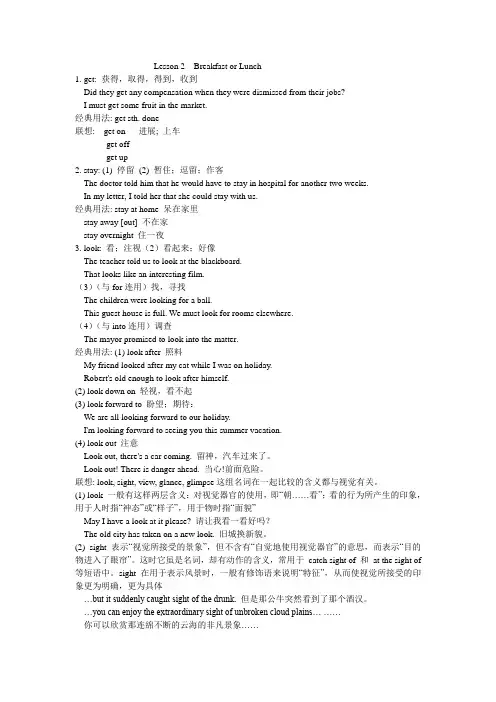
Lesson 2 Breakfast or Lunch1. get: 获得,取得,得到,收到Did they get any compensation when they were dismissed from their jobs?I must get some fruit in the market.经典用法: get sth. done联想: get on 进展; 上车get offget up2. stay: (1) 停留(2) 暂住;逗留;作客The doctor told him that he would have to stay in hospital for another two weeks.In my letter, I told her that she could stay with us.经典用法: stay at home 呆在家里stay away [out] 不在家stay overnight 住一夜3. look: 看;注视(2)看起来;好像The teacher told us to look at the blackboard.That looks like an interesting film.(3)(与for连用)找,寻找The children were looking for a ball.This guest house is full. We must look for rooms elsewhere.(4)(与into连用)调查The mayor promised to look into the matter.经典用法: (1) look after 照料My friend looked after my cat while I was on holiday.Robert's old enough to look after himself.(2) look down on 轻视,看不起(3) look forward to 盼望;期待:We are all looking forward to our holiday.I'm looking forward to seeing you this summer vacation.(4) look out 注意Look out, there's a car coming. 留神,汽车过来了。
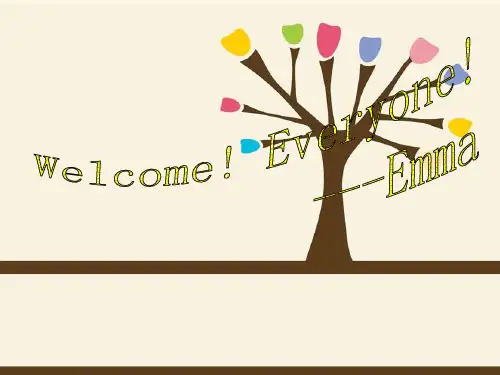
![[全]新概念英语(第2册第2课)详解](https://uimg.taocdn.com/f44b786edd3383c4bb4cd2ef.webp)
新概念英语(第2册第2课)详解新Lesson 2 (标★者核心解析)1. ★until [ən'til, ʌn'til] prep.直到2. ★outside [aut'said] ad.外面3. ★ring [riŋ] v.(铃、电话等)响4. aunt [ɑ:nt] n.姑,姨,婶,舅妈5. ★repeat [ri'pi:t] v.重复;重说1. until [ən'til] prep.直到。
作介词及连词preposition, conjunction一、基本词义及用法————————————————1 up to the time that,到…时;直到…时,用语肯定句I was up until three o'clock trying to get it finished! 为了完成工作,我一直干到3点!We had better wait until Antony's here? 我们最好等到安东尼来。
————2 not until not before a particular time or event 直到…才。
用语否定句。
We didn't eat till past midnight. 直到过了午夜我们才吃东西。
What ever we do, won't stop until it's finished. 不论做什么,我们都不会半途而废。
——————3. 常见定势思维❌错误:(1)COMMONLEARNER ERROR: until now or so far?Warning: choose the correct adverb! 注意:選擇正確的副詞!(A)Use 'until now' to talk about a situation that existed, but has just ended: ‘until now’用於表示剛剛結束的過去的某種情況。
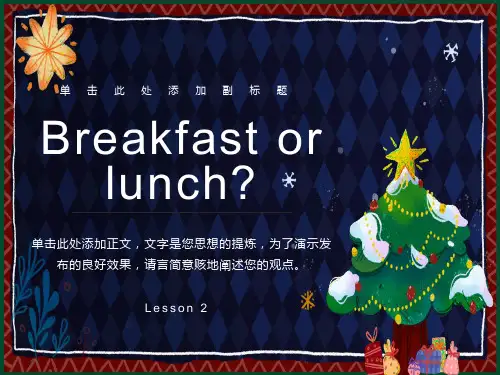
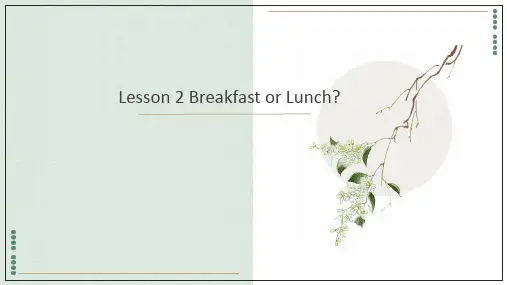
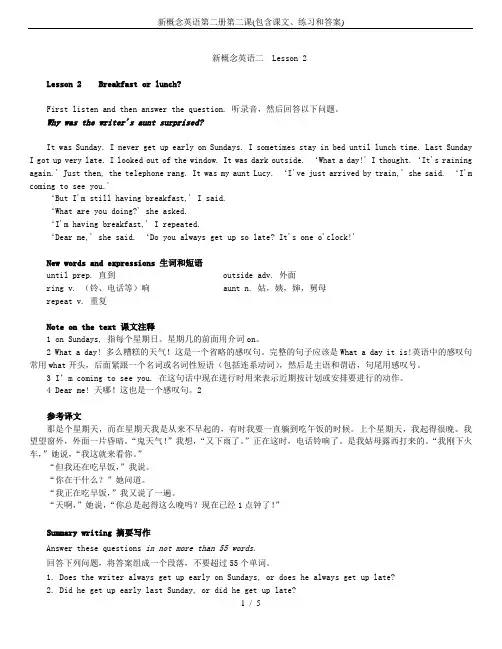
新概念英语二 Lesson 2Lesson 2 Breakfast or lunch?First listen and then answer the question. 听录音,然后回答以下问题。
Why was the writer's aunt surprised?It was Sunday. I never get up early on Sundays. I sometimes stay in bed until lunch time. Last Sunday I got up very late. I looked out of the window. It was dark outside. ‘What a day!' I thought.‘It's raining again.' Just then, the telephone rang. It was my aunt Lucy. ‘I've just arrived by train,' she said. ‘I'm coming to see you.'‘But I'm still having breakfast,' I said.‘What are you doing?' she asked.‘I'm having breakfast,' I repeated.‘Dear me,' she said. ‘Do you always get up so late? It's one o'clock!'New words and expressions 生词和短语until prep. 直到 outside adv. 外面ring v. (铃、电话等)响 aunt n. 姑,姨,婶,舅母repeat v. 重复Note on the text 课文注释1 on Sundays, 指每个星期日。

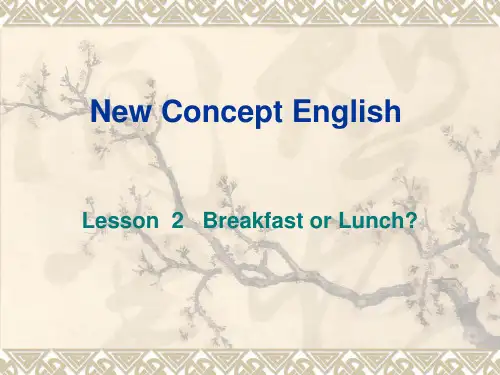
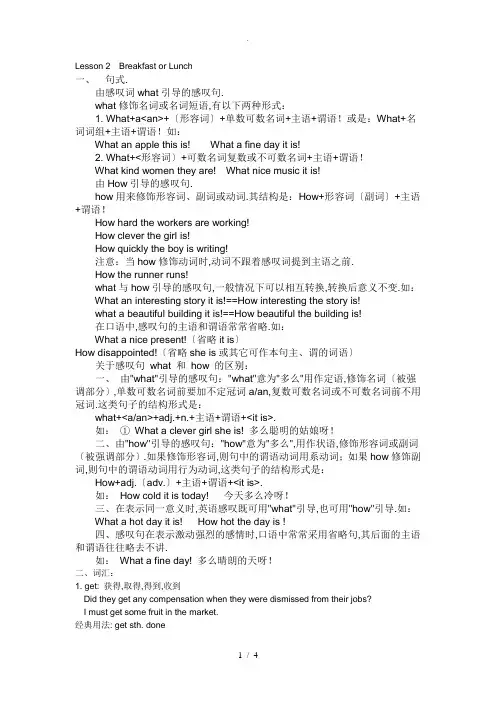
Lesson 2 Breakfast or Lunch一、句式.由感叹词what引导的感叹句.what修饰名词或名词短语,有以下两种形式:1. What+a<an>+〔形容词〕+单数可数名词+主语+谓语!或是:What+名词词组+主语+谓语!如:What an apple this is! What a fine day it is!2. What+<形容词〕+可数名词复数或不可数名词+主语+谓语!What kind women they are! What nice music it is!由How引导的感叹句.how用来修饰形容词、副词或动词.其结构是:How+形容词〔副词〕+主语+谓语!How hard the workers are working!How clever the girl is!How quickly the boy is writing!注意:当how修饰动词时,动词不跟着感叹词提到主语之前.How the runner runs!what与how引导的感叹句,一般情况下可以相互转换,转换后意义不变.如:What an interesting story it is!==How interesting the story is!what a beautiful building it is!==How beautiful the building is!在口语中,感叹句的主语和谓语常常省略.如:What a nice present!〔省略it is〕How disappointed!〔省略she is或其它可作本句主、谓的词语〕关于感叹句what 和how 的区别:一、由"what"引导的感叹句:"what"意为"多么"用作定语,修饰名词〔被强调部分〕,单数可数名词前要加不定冠词a/an,复数可数名词或不可数名词前不用冠词.这类句子的结构形式是:what+<a/an>+adj.+n.+主语+谓语+<it is>.如:①What a clever girl she is! 多么聪明的姑娘呀!二、由"how"引导的感叹句:"how"意为"多么",用作状语,修饰形容词或副词〔被强调部分〕.如果修饰形容词,则句中的谓语动词用系动词;如果how修饰副词,则句中的谓语动词用行为动词,这类句子的结构形式是:How+adj.〔adv.〕+主语+谓语+<it is>.如:How cold it is today! 今天多么冷呀!三、在表示同一意义时,英语感叹既可用"what"引导,也可用"how"引导.如:What a hot day it is! How hot the day is !四、感叹句在表示激动强烈的感情时,口语中常常采用省略句,其后面的主语和谓语往往略去不讲.如:What a fine day! 多么晴朗的天呀!二、词汇:1. get: 获得,取得,得到,收到Did they get any compensation when they were dismissed from their jobs?I must get some fruit in the market.经典用法: get sth. done联想: get on 进展; 上车get offget up2. stay: <1> 停留<2> 暂住;逗留;作客The doctor told him that he would have to stay in hospital for another two weeks.In my letter, I told her that she could stay with us.经典用法: stay at home 呆在家里stay overnight 住一夜3. look: 看;注视〔2〕看起来;好像The teacher told us to look at the blackboard.That looks like an interesting film.〔3〕〔与for连用〕找,寻找The children were looking for a ball.This guest house is full. We must look for rooms elsewhere.〔4〕〔与into连用〕调查The mayor promised to look into the matter.经典用法: <1> look after 照料My friend looked after my cat while I was on holiday.Robert's old enough to look after himself.<2> look down on 轻视,看不起<3> look forward to 盼望;期待:We are all looking forward to our holiday.I'm looking forward to seeing you this summer vacation.<4> look out 注意Look out, there's a car coming. 留神,汽车过来了.Look out! There is danger ahead. 当心!前面危险.联想: look, sight, view, glance, glimpse这组名词在一起比较的含义都与视觉有关.<1> look 一般有这样两层含义:对视觉器官的使用,即"朝……看〞;看的行为所产生的印象,用于人时指"神态〞或"样子〞,用于物时指"面貌〞May I have a look at it please? 请让我看一看好吗?The old city has taken on a new look. 旧城换新貌.<2> sight 表示"视觉所接受的景象〞,但不含有"自觉地使用视觉器官〞的意思,而表示"目的物进入了眼帘〞.这时它虽是名词,却有动作的含义,常用于catch sight of 和at the sight of 等短语中.sight 在用于表示风景时,一般有修饰语来说明"特征〞,从而使视觉所接受的印象更为明确,更为具体…but it suddenly caught sight of the drunk. 但是那公牛突然看到了那个酒汉.…you can enjoy the extraordinary sight of unbroken cloud plains… ……你可以欣赏那连绵不断的云海的非凡景象……<3> view 在表示动作概念时,含有注视的意思;在表示风景时,不象sight 那样要求有修饰语.如果说sight 有"视力〞的含义,那么view 有"见解〞的含义…The landscape is hidden from view. …大地的风光被遮住而看不见了<其含义是想去观赏,凝视>An aeroplane offers you an unusual and breathtaking view of the world.飞机为你提供非凡的,令人惊诧不已的地球景色.〔句中的view 既有凝视的动作含义,又有风景的状态含义〕He always takes an extreme view. 他总是持极端见解.<4> glance 的原义是"闪现〞,如活动着的反光物体在阳光下的闪烁,后来慢慢演变为"迅速的看〞这一含义He took a glance at it briefly, and then he told me to look again.他向它略略瞟了一眼,然后叫我再看看.<5> glimpse 既可表示瞥一眼的行为,又可表示瞥一眼所看到的东西When he began to play a tune, we had our first glimpse of the snake.当他开始吹一支曲子时,我们第一次瞥见了那条蛇.This is my glimpse of New York. 这就是我对纽约的一瞥所见.4. What a day!What a fine day. / How fine it is today.What a beautiful girl. / How beautiful she is.5. just then:just now:just:6. ring: 发出响声He rang the bell but no one came to the door.How long has that telephone been ringing ?经典用法: give sb. a ring 给…打/ I gave him a ring.联想: n. 戒指, 耳环/ a wedding ring7. arrive: 到达, 来到<in, at>经典用法: to arrive home 到家arrive at a conclusion 得出结论to arrive at a decision 达成决议Until直到….为止, not until直到…才肯定形式表示的意思是"做某事直至某时",动词必须是延续性的.否定形式表达的意思是"直至某时才做某事".动词为延续性或非延续性都可以频率副词Sometimes always usually rarely frequentlyLesson2. 1. <c> 2. <d> 3. <c> 4. <c> 5. <a> 6.<b> 7. <b> 8. <a> 9.<d> 10. <c> 11. <d> 12. <b>词法:以重读闭音节结尾的词,如果末尾只有一个辅音字母,动词变名词:run ---- runner动名词:run ---- running put ---- putting forget ---- forgetting过去式和过去分词:plan ---- planned stop ---- stopped形容词的比较级:big ---- bigger名词变形容词:star ---- starry前边和后边都有一个辅音,把元音夹在中间,就好像把元音关在里边一样,所以称为闭音节.如果这个音节节在单词中是重读的,那么,它就是重读闭音节.例如begin 的音标:[bi'gin] 中[gin]是重读的,注意前边那个小符号:['] 就表示重读,而且[g]和[n]都是辅音,中间夹的[i]是元音.所以[gin]就是一个重读闭音节.单元音12个如下1> [i:] sea, he, see, piece, ceiling2> [i]sit, build, miss, myth3> [e] bed, desk, head,4> [ ae] bad, land, bank, stamp <a和e中间是连起来的>5> [a:] car, fast, class, plant, calm, aunt6> [ ɔ] hot, want7> [ ɔ:] door, more, sport, ball, warm, author, court, bought, caught8> [u:] good, who, blue, soup,9> [u] look, put, women, could10> [ ʌ] cup, come, blood, rough11> [ ə:] girl, work, serve, nurse12> [ə ] cadre, ago, forget, polite, dollar, doctor, famous, Saturday补充比较词汇:late作形容词,可以作表语〔表示迟的,晚的〕或前置定语〔表示晚的,最近的,新的,前任的〕,如I'm late for the first class. He came back in the late afternoon.The late Primer Minister is still quite active in politics. Some late news of the war has just come in.late作副词,表示〔1〕迟到Tom came to school late and missed the first class. 〔2〕晚地He often worked late into the night. 与late作表语时表意相同later作形容词,表示…之后的,作后置定语,跟在时间段之后,如He found his first job 2 months later after his graduation. 表示后来的,之后的,作前置定语,如We will discuss this in detail in a later chapter.later作副词<1>late的比较级,较晚地,如I went to bed later than usual.〔2〕以后,晚些时候,如I'll tell you later. 〔我以后再告诉你.〕〔其实这也可以理解成〔1〕的意思,就是later than now,不过约定俗成了,就表示以后〕latter形容词,late的比较级,表示后者的,较后的.经常用在the former....the latter中表示后者. lately副词,表示最近.I haven't had enough sleep lately. I haven't heard any news from my son lately. What have you been doing lately? 〔你近来做些什么?〕Remark vt察觉vi 评论。
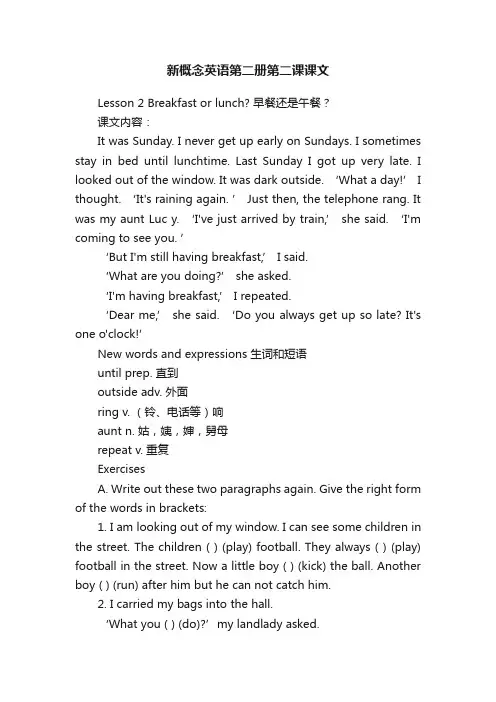
新概念英语第二册第二课课文Lesson 2 Breakfast or lunch? 早餐还是午餐?课文内容:It was Sunday. I never get up early on Sundays. I sometimes stay in bed until lunchtime. Last Sunday I got up very late. I looked out of the window. It was dark outside. ‘What a day!’ I thought. ‘It's raining again. ’ Just then, the telephone rang. It was my aunt Luc y. ‘I've just arrived by train,’ she said. ‘I'm coming to see you. ’‘But I'm still having breakfast,’ I said.‘What are you doing?’ she asked.‘I'm having breakfast,’ I repeated.‘Dear me,’ she said. ‘Do you always get up so late? It's one o'c lock!’New words and expressions 生词和短语until prep. 直到outside adv. 外面ring v. (铃、电话等)响aunt n. 姑,姨,婶,舅母repeat v. 重复ExercisesA. Write out these two paragraphs again. Give the right form of the words in brackets:1. I am looking out of my window. I can see some children in the street. The children ( ) (play) football. They always ( ) (play) football in the street. Now a little boy ( ) (kick) the ball. Another boy ( ) (run) after him but he can not catch him.2. I carried my bags into the hall.‘What you ( ) (do)?’my landlady asked.‘I ( ) (leave), Mrs. Lynch,’I answered.‘Why ( you ) (leave)?’she asked. ‘You have been here only a week.’‘A week too long, Mrs. Lynch,’I said.‘There are too many rules in this house. My friends never ( ) (come) to visit me. Dinner is always at seven o’clock, so I frequently ( ) (go) to bed hungry. You don’t like noise, so I rarely ( ) (listen) to the radio. The heating doesn’t work, so I always ( ) (feel) cold. This is a terrible place for a man like me. Goodbye, Mrs. Lynch.’Write these sentences again. Each sentence must begin with What.1. This is a wonderful garden!2. This is a surprise!3. He is causing a lot of trouble!4. They are wonderful actors!5. She is a hard-working woman!6. It is a tall building!7. It’s a terrib le film!8. You are a clever boy!9. She is a pretty girl!10. He is a strange fellow!Comprehension1. ( ) When Aunt Lucy telephoned(a) the writer was asleep. (b) the writer was still in bed.(c) the writer had already got up. (d) the writer was having lunch.2. ( ) Aunt Lucy was surprised because(a) the writer was having lunch. (b) it was one o’clock.(c) it was late. (d) the writer was having breakfast at lunch time.Structure3. He sometimes ( ) in bed until lunch time.(a) stay (b) is staying (c) stays (d) staying4. He stayed in bed until lunch time. He went ( ) bed late last night.(a) in (b) into (c) to (d)at5. He doesn’t get up early on Sundays. He gets up ( ).(a) late (b) lately (c) slowly (d) hardly6. ( ) did aunt Lucy come? By train.(a) When (b) How (c) Why (d) Where7. The writer can’t see aunt Lucy ( ). He’s having breakfast.(a) still (b) now (c) often (d) always Vocabulary8. He ( ) out of the window and saw that it was raining.(a) looked (b) saw (c) remarked (d) watched9. Just then, the telephone rang. It rang ( ).(a) at once (b) immediately (c) again (d) at that moment10. She was his aunt, so he was her ( ).(a) son (b) grandson (c) nephew (d) niece11. Breakfast is the first ( ) of the day.(a) food (b) dinner (c) lunch (d) meal12. Aunt Lucy said,‘Dear me’because she was ( ).(a) angry (b) surprised (c) tired (d) pleasedLesson 3 Please send me a card课文内容:Postcards always spoil my holidays. Last summer, I went to Italy. I visited museums and sat in public gardens. A friendly waiter taught me a few words of Italian. Then he lent me a book.I read a few lines, but I did not understand。
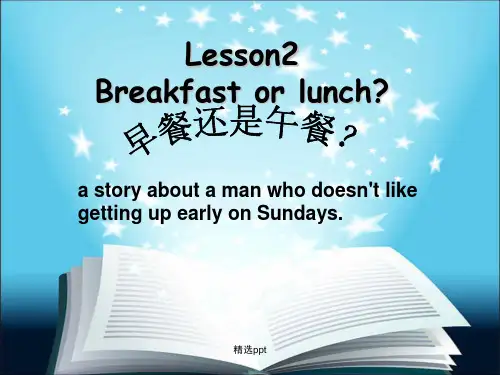
Lesson 2 - Breakfast or lunch? Text It was Sunday.I never get up early on Sundays.I sometimes stay in bed until st Sunday,I got up very late.I looked out of the window.It was dark outside."What a day!"I thought.It's raining again.Just then,the telephone rang.It was my aunt Lucy."I've just arrived by train."she said."I'm coming to see you." "But I'm still having breakfast."I said. "What are you doing?"She asked. "I'm having breakfast."I repeated. "Dear me!"She said."Do you always get up so late?It's one o'clock." New words and expressions 生词和短语until prep. 直到 outside adv. 外面 ring v. (铃、电话等)响 aunt n. 姑,姨,婶,舅母repeat v. 重复Note on the text 课文注释 1 on Sundays, 指每个星期日。
星期几的前面用介词on。
2 What a day! 多么糟糕的天气!这是一个省略的感叹句。